As hard tech emerges as a key engine driving a new round of technological revolution and industrial transformation, a resource matchmaking event was officially launched, aiming to forge connections between venture capital institutions and high-quality projects while driving deeper capital-industry integration.
On August 13, the "Visit to CAS STAR" event, guided by the Zhangjiang Science City Technology and Industry Service Center and hosted by Zhangtongnet and CAS Star, was successfully held. As the first phase of the "Visit Venture Capital Institutions" series, the event attracted over 40 entrepreneurs and investors to Zhangjiang, Shanghai, to discuss new opportunities for "investing in hard tech" and "developing hard tech" in the context of new quality productive forces.
As an early-stage investment institution focused on the "hard & core tech", CAS Star delves deeply into five major physical fields: information, energy, matter, space, and life. From identifying innovative sparks in research institutes to nurturing tech startups toward robust growth, it is consistently dedicated to bridging the gap between laboratory achievements and industrial applications—breathing life into hard tech, putting it into practical use, and strengthening its role as a vital force energizing regional scientific and technological innovation.
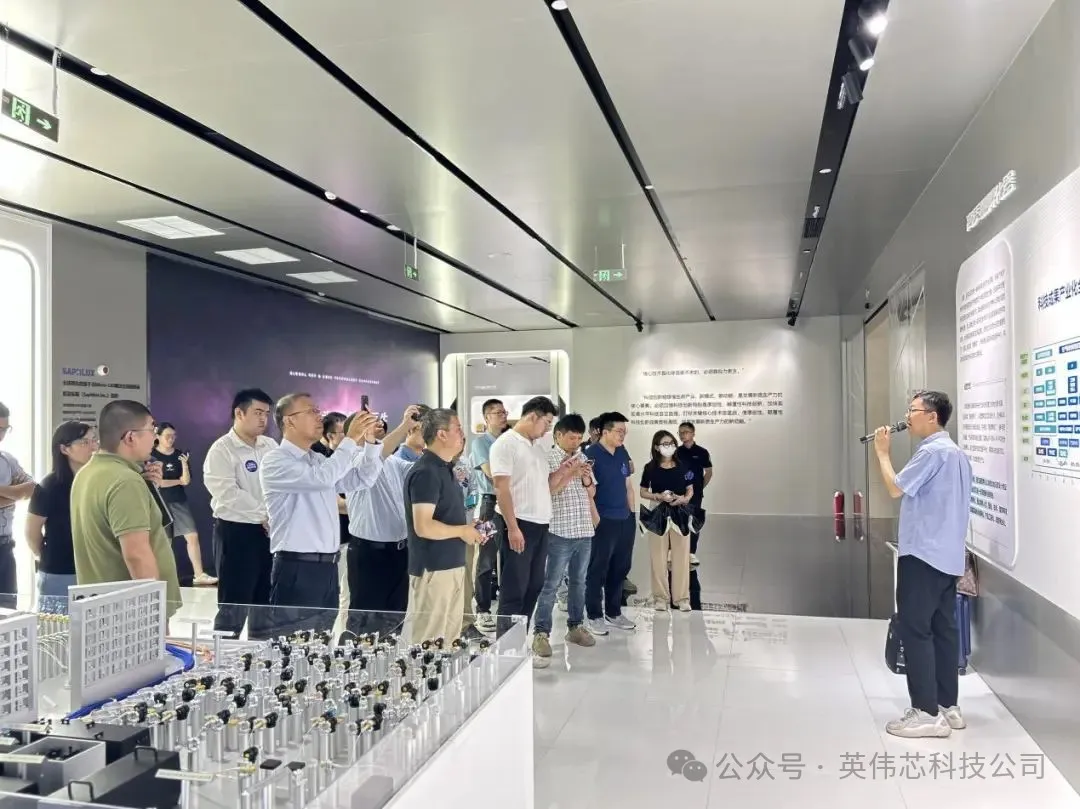
Visit to CAS Star Exhibition Hall
Following registration, guests were guided by professional explainer on a tour of the exhibition hall, offering an immersive experience into CAS STAR’s development over the past decade and its achievements in hard tech incubation. On display were models such as the photonic quantum computer "Jiuzhang 3.0," samples of new flexible electromagnetic shielding materials, and a spherical tokamak equipped with high-temperature superconducting magnets. The explainer provided detailed and engaging explanations of each exhibit, making complex hard tech concepts tangible and accessible through clear, easy-to-follow presentations.
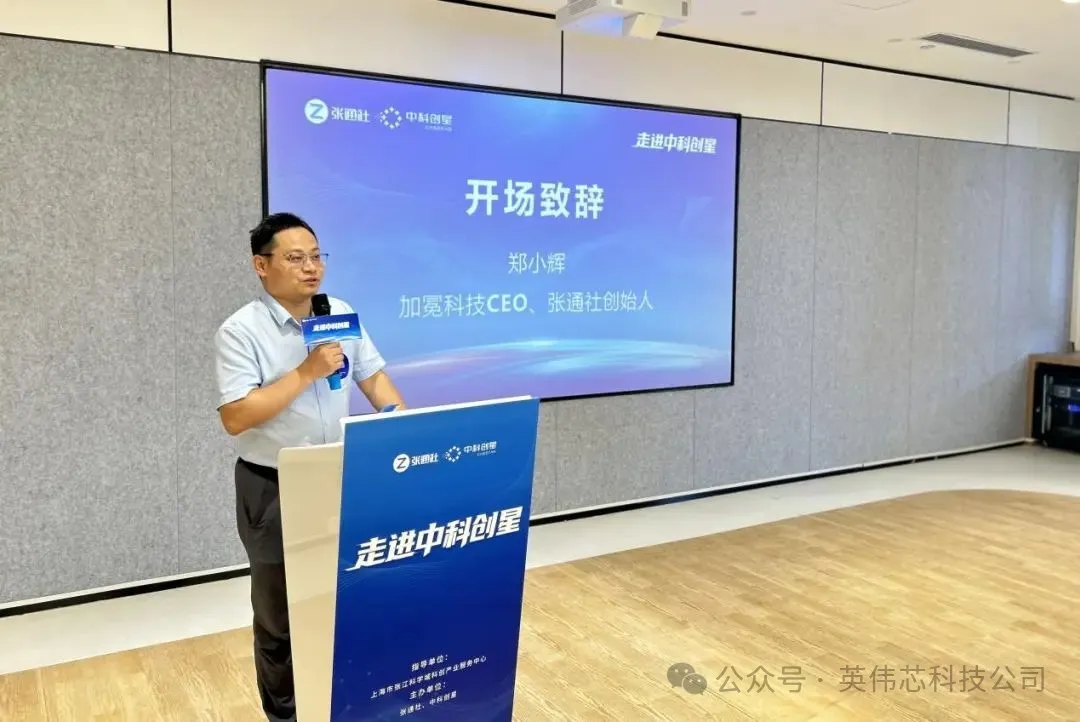
Zheng Xiaohui, CEO of Coronation Tech and Founder of Zhangtongshe
At the beginning of the event, Zheng Xiaohui, CEO of Coronation Tech and founder of Zhangtongshe, delivered an opening address, expressing his sincere gratitude to the guests in attendance. He explained that the reason CAS STAR was selected as the first stop for the "Visiting Venture Capital Institutions" series lies in its pioneering role and leading strength in hard tech investment. Zheng noted that Zhangtongshe has been deeply rooted in Zhangjiang for years, consistently dedicating itself to serving the sci-tech innovation ecosystem—from hosting numerous events that bridge industry and research, to releasing the 2024 Report on Investment and Financing Ecosystem of Shanghai Tech Enterprises at this year’s Shanghai Sci-Tech Forest Conference. Throughout, Zhengtongshe has served as both recorder and witness of this journey. The report particularly highlights the outstanding performance of hard tech companies invested in by CAS STAR.
To date, the company has built a comprehensive service matrix that includes the Zhangtongshe Media Platform, the Link database, Coronation Research Institute, and the Xuniu mini-program—all designed to help enterprises efficiently connect resources and expand their operations. Looking ahead, Zheng looks forward to collaborating with CAS STAR to discover and share the innovation stories of more outstanding companies, making hard tech visible to more people.
As CAS STAR Marked Its 10th Anniversary,
It Began a New Chapter with Shanghai
The partnership between CAS STAR and Shanghai represents a deep integration of technological innovation and industrial advancement.
As a founding partner of CAS STAR, Mi Lei carries multiple labels. He is the pioneer proposer of concepts of “hard tech” and “ESK” (where “E” stands for economic value, “S” for social value, and “K” for knowledge value). He was also among the first investors to advocate for “investing early, in small companies, with long-term vision, and in hard tech,” promoting the notion of “patient capital.”
As early as 2010, Mi Lei introduced the concept of “hard tech.” In his definition, hard tech refers to critical core technologies with high technical barriers and clear application scenarios. These technologies represent the most advanced level of global scientific development, lead new rounds of technological revolution and industrial transformation, and play a vital supporting role in economic and social development.
The emergence and growth of hard tech are closely tied to the historical context of the time. Although China was experiencing rapid economic growth around that period, the 2008 financial crisis had brought new challenges to the global and Chinese economies. Against this backdrop, Mi Lei conducted an in-depth analysis of the relationship between technological progress and economic growth, arguing that China’s economic expansion must transition from being factor-driven and investment-driven to innovation-driven.
However, core technologies in many fields—such as semiconductors and advanced materials—were still subject to “chokepoint” restrictions by developed countries. Societal recognition and investment in these critical core technologies fell far short of what was needed. Therefore, promoting the rooting and growth of hard tech in China has become an imperative proposition of the era.
CAS STAR launched in 2013 to industrialize scientific and technological achievements, starting by investing in photonics technology as its first project.
Six years later, a strategic response spanning 1,500 kilometers set the stage for the story between CAS STAR and Shanghai: On November 3, 2019, during an inspection tour in Shanghai, general secretary Xi Jinping emphasized that the Sci-Tech Innovation Board (STAR Market) and the pilot registration-based IPO system must stay true to their founding purpose—improving the quality of listed companies while supporting and encouraging “hard tech” enterprises to go public. This directive provided a fundamental guideline for Shanghai to gather high-quality hard tech resources.
Leveraging Shanghai’s strengths as a technological innovation hub, CAS STAR launched a high-quality incubator in the city in October 2023. This initiative introduced new models of “forward-looking incubation” and “in-depth incubation,” creating a new growth pole for future technology investment and incubation, and supporting the high-quality development of hard tech companies as well as the nurturing of emerging technologies.
Today, CAS STAR manages over RMB 13 billion in assets and has invested in and incubated more than 530 hard tech projects across eight major fields: photonic chips, artificial intelligence, aerospace, biotechnology, information technology, new materials, new energy, and smart manufacturing. Its portfolio includes champion hard tech companies such as YJ Tech, ZKWI, Tanka Tada, Zhipu AI, Zhongke Aerospace, Xizhi Technology, Wiguang Medical, DeepTrust Bio, and Zhiyuan Robotics.
Dedicated to Hard Tech, Empowering AI+
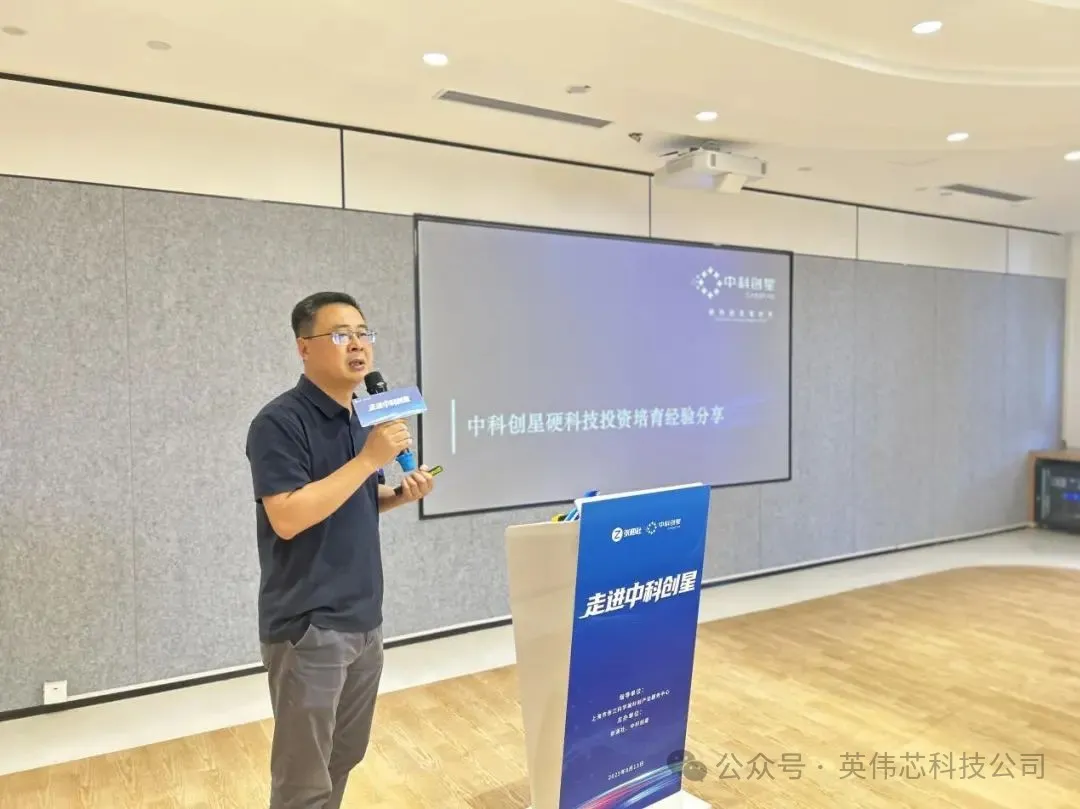
A representative from CAS STAR
At the event, a representative from CAS STAR gave a presentation titled "Sharing CAS STAR's Experience in Hard Tech Investment and Cultivation."
It is reported that Shanghai has now established 12 high-quality incubators. Among them, CAS STAR (Shanghai) High-Quality Incubator was the first selected and is one of China’s earliest specialized platforms dedicated to hard tech investment and incubation.
In terms of financial support, CAS STAR initiated the establishment of the CAS STAR Pioneer Venture Investment Fund, which focuses on the "AI+" sector, providing capital support to world-leading talent-driven enterprises and guiding cutting-edge global industries to gather in Shanghai. The fund achieved its first close of RMB 2.617 billion on July 16 this year.
The fund primarily invests in hard tech projects that integrate knowledge value, social value, and economic value across industries centered on artificial intelligence, including matter, energy, information, life, and space. Specific focuses in project sourcing and technology layout include: Matter (high-end membrane materials, high-performance composite materials, non-silicon-based core materials), Energy (controlled nuclear fusion, new energy storage systems), Information (photonic chips, quantum technology, AI, embodied intelligence), Space (autonomous driving technology, deep-space technology), and Life (brain-computer interfaces, synthetic biology, gene and cell therapies). Based on these domains, the fund aims to build a repository of disruptive technologies and a talent pool.
Beyond financial support, CAS STAR emphasizes deep incubation for enterprises. By providing comprehensive rainforest-like ecosystem support—including human, financial, material, and market resources—it accelerates the industrialization of technology. Its core approach involves deep collaboration with universities, research institutions, and organizations such as TR35 and The Innovation to precisely identify high-level talent teams, including academicians, top young scientists, and leaders of major national science and technology projects. For companies that pass a 3–6 month trial operation period, it assists in forming professional teams, securing investments, and connecting resources across various fields, offering all-around support for project growth.
These projects will be incubated at the CAS STAR (Shanghai) High-Quality Incubator. Through a systematic "Five Ones" framework, the incubator focuses on "forward-looking incubation" and "deep incubation" of future technologies, enabling continuous innovation from 0 to 1, 10, and 100. The goal is to incubate a group of future-original technologies, cultivate a cohort of hard tech champion companies, form future industrial clusters, and create a "nuclear explosion point" for technological innovation in Pudong.
nsights from 2 Hard Tech Companies
on Commercialization Practices
Right after, representatives from two hard tech companies invested by CAS STAR took the stage to share their experiences.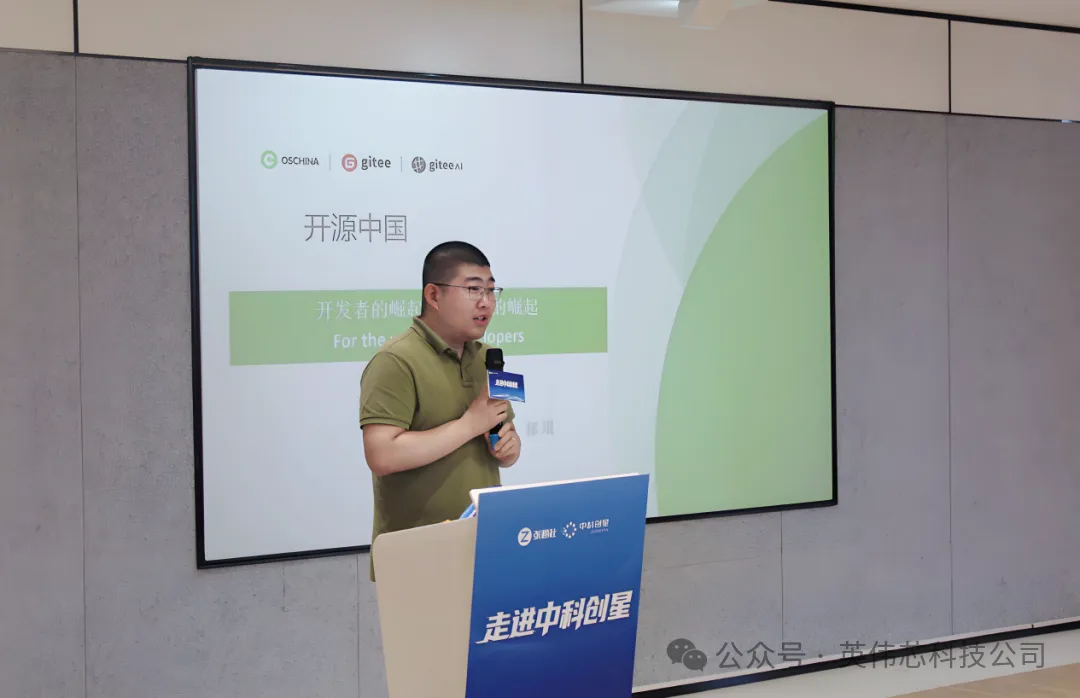
Yu Kun, Shanghai Lead of OSCHINA Private Cloud
Among them, Yu Kun, Shanghai Lead of OSCHINA Private Cloud, introduced the company’s development journey, core business layout, and future vision. He systematically explained the synergistic development model between the OSCHINA community, the Gitee software engineering platform, and the ModelArk AI engineering platform.
Moving forward, OSCHINA will strengthen collaboration with various sectors of society. On one hand, it will leverage its platform advantages to identify and promote outstanding open-source projects, while integrating Gitee and ModelArk to form an AI software engineering platform that helps developers and enterprises enhance R&D efficiency in the AI era. On the other hand, it will work with partners to improve the open-source talent development system, boost the vitality of China’s open-source and AI ecosystem, continuously empower developers, and inject new momentum into the high-quality development of China’s open-source and AI industries.
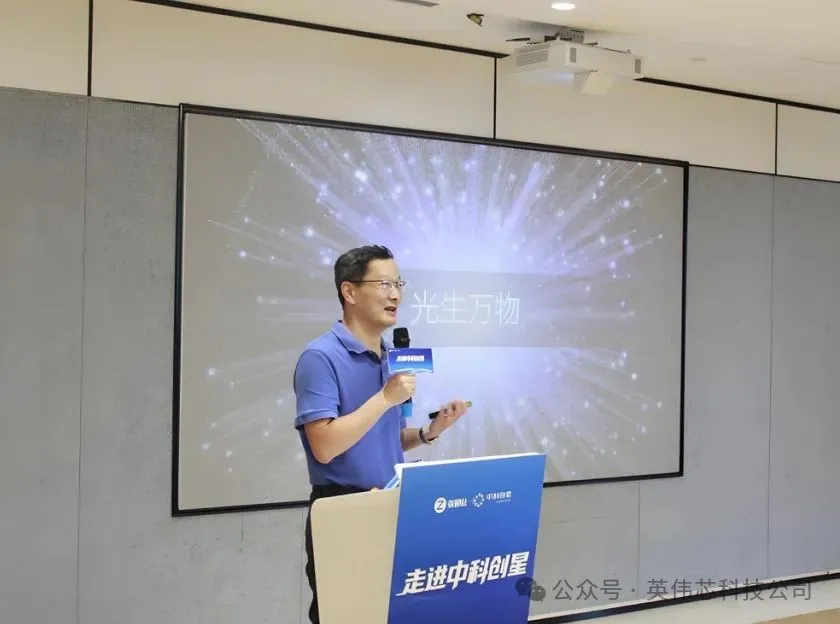
Nie Hui, Founder of Nvision Technology
Afterwards, Nie Hui, Founder of Nvision, delivered an insightful sharing. Centered on the question “Where is Moore’s Law for Light?”, he systematically explained the underlying logic of the silicon photonics industry: the essence of silicon photonics is to extend Moore’s Law in the optical field through the integration of “silicon + light,” thereby overcoming the bottlenecks of traditional electrical interconnects in bandwidth, power consumption, and cost. He introduced that Nvision is now focusing on wafer-level integration technology, planning to combine functions of hundreds of optical modules—such as lasers, modulators, and detectors—onto a single chip through hybrid bonding of III-V 8 or 12-inch wafers. The ultimate goal is to achieve “wafer-level Optical I/O (OIO).”
The presentations from the two representatives vividly demonstrated the active exploration and practical achievements of hard tech companies in technological innovation and commercialization across different fields, sparking widespread resonance among the audience.
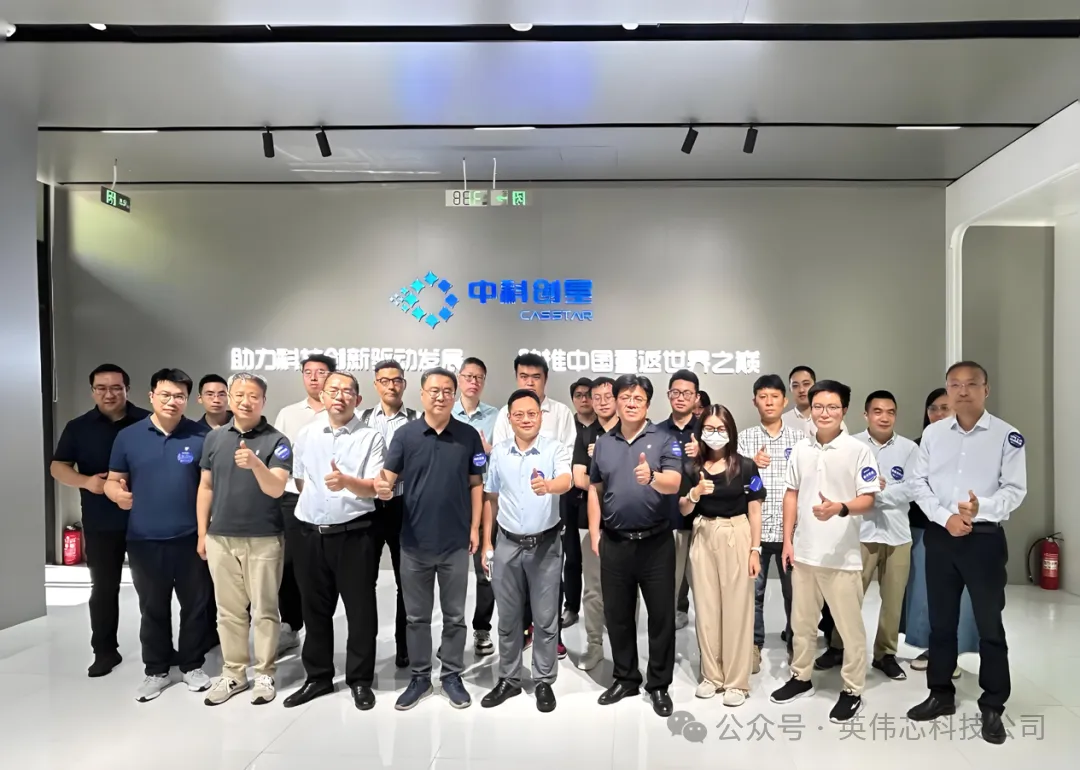
Group Photo at the "Visit to CAS STAR" Event
Following the corporate sharing session, attendees took turns introducing themselves, engaging in lively discussions on industry trends, technological breakthroughs, and collaboration opportunities. The event fostered a dynamic atmosphere filled with energetic exchanges of ideas, building an effective platform for communication and cooperation among all participants.
From the tangible display of cutting-edge achievements like the "Jiuzhang 3.0" quantum computer in the exhibition hall, to the sharing of CAS STAR’s "forward-looking incubation" model, and further to the practical explorations in technology commercialization by companies like OSChina and Nvision—every segment highlighted the vibrant momentum of hard tech transitioning from the laboratory to real-world industry.
As the initiator and witness of the event, Zhangtongshe will continue to collaborate with leading institutions like CAS STAR, leveraging media influence to connect innovation resources, empowering industrial growth with data and insights, and staying rooted in Zhangjiang—this fertile ground of technological innovation. Driven by policy guidance, capital support, and determined entrepreneurial efforts, more technological breakthroughs advancing “from 0 to 1 to 100” are expected to emerge, injecting continuous momentum into the rise of China’s hard tech industry.
Let us look forward to the next stop of the "Visiting Venture Capital Institutions" series, which will continue to delve into the core of industries and decode more secrets of innovation!





